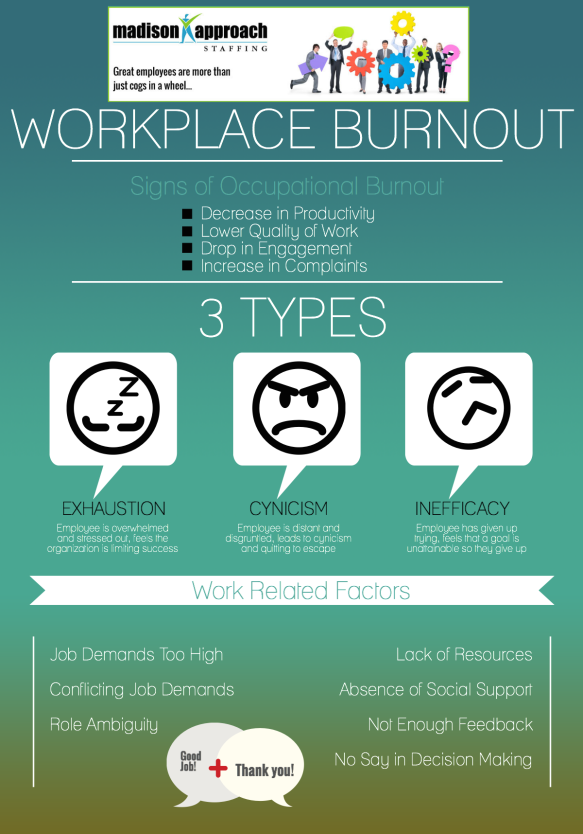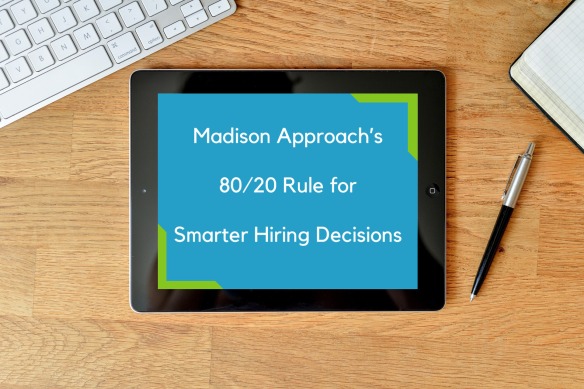 Job burnout is recognized as neither an ailment nor a neurosis, but it doesn’t take a physician or psychologist to diagnose workplace burnout. It may, however, take an informed and experienced manager. Being able to recognize the signs of burnout and implement the right solutions for your employees can mean increased productivity, loyalty and a happier workplace.
Job burnout is recognized as neither an ailment nor a neurosis, but it doesn’t take a physician or psychologist to diagnose workplace burnout. It may, however, take an informed and experienced manager. Being able to recognize the signs of burnout and implement the right solutions for your employees can mean increased productivity, loyalty and a happier workplace.
Studies have shown that burnout is more likely to affect those working in positions with high stress and emotional demands, such as social workers, police officers, lawyers, teachers, nurses, doctors, engineers and customer service representatives. These can all be characterized by contact with other people whose demands can be emotionally draining.

What is burnout?
Burnout is a level of stress that affects employees physically, emotionally and mentally leading to exhaustion on all levels. There are 3 types of burnout:
- Exhaustion
- The stressed out employee who is overwhelmed but continues to strive for success by working at all hours despite fracturing personal relationships both at work and at home.
- Cynicism
- An under-challenged employee who feels a lack of development and value for their work. This employee will begin to distance him or herself from their work, coworkers and the company.
- Inefficacy
- The employee who gradually loses all motivation. Despite seeing a goal to strive for, the barriers between them and success feel insurmountable.
Signs of Burnout in Employees
This is where experience can help a manager differentiate between a bad employee and an employee on the road to burnout. A manager who knows his or her employees well has an advantage, as the warning signs vary from person to person. Keep an eye out for:
- Lower quality of work
- Decreased productivity
- Drop in job satisfaction
- A noticeable decrease in engagement
- Greater disruption of coworkers’ tasks
- Reduced commitment to both the job and the company
- More and more work absences
Effects of Job Burnout
Like depression and anxiety disorders, burnout can affect the sufferer on physical, interpersonal and emotional levels. Social relationships may either be dropped entirely – through overworking or withdrawal – or become strained from defensive behavior or an increased tendency towards conflict. Often a burned-out employee is unable to understand that stress is the root of their problems.
Burnout can also lead to health problems, such as headaches, colds and insomnia – all of which are caused by maintaining high levels of stress and emotional exhaustion. Further health risks include an increased dependence on self-medication including alcohol, smoking, sleeping pills, mood elevators, and stimulants.
Causes of Occupational Burnout
Only an experience and involved manager will be able to pinpoint the causes in a particular employee, as they run the entire spectrum of workplace issues:
- Overload of work
- Conflicting job demands
- Tasks that are impossible or nearly impossible to complete
- Lack of resources whether training, funds or technology
- A critical boss
- Ingrained perfectionism
- Lack of recognition
- Not enough information about their role
- Not enough feedback
- Difficult clients
- Lack of social support
- Inadequate pay
- Conflicting roles between home and work
- Not enough participation in decision making
- Under-employment
- Menial tasks with no end
- Personal values conflict with company values
- Achieved goals seem meaningless
- Bureaucracy
- A lack of social or emotional skills
Prevention of Burnout
For a manager, taking steps to prevent burnout is a balancing act between maintaining productivity at the office and recognizing what type of burnout your employees are more prone to fall prey.
Train your team well, equip them with the right tools and the resources they need. Don’t spread them too thin – understand the difference between challenging them and overwhelming them. Also be sure to clearly define their roles and give every member something to own, a part of the company where their decisions are key, no matter how small. Provide support and feedback while rewarding and promoting for good work. Be fair and make sure their voices are heard.
Let your employees follow their passion – whether this means rearranging positions in the company or allowing time for work-related side project – find a way to make sure they are doing what they love.
Foster a work culture that makes it acceptable to socialize during breaks but where cattiness and pettiness is unacceptable. Train your employees on stress management, educate them on burnout and make every employee responsible for preventing burnout in themselves and their coworkers.
Some employees need to be forced to take breaks or given a cutoff time for when they have to stop answering email from home. Others find the best reward is being given a mental health day pass or one day a month when they get to leave early to pick up their kids from school. Giving them a chance to balance home and work goes a long way to getting the most out of your employees and creating a work culture that retains productive and innovative employees.
While extreme cases of burnout can be scary, the good news is that it is both reversible and preventable. Educate yourself and your employees and take some time to take your employees out for a meal to learn more about their passions, aspirations and what changes they would like to see. Following through with employee feedback is the best way to make them heard, respected and valued.
The bottom line is a burned out employee is not productive and a drag on an organization, large or small. Providing a productive workforce is the job of every manager and helping your team to manage workplace stress and providing them the environment and tools to be successful is essential for the success of the organization and the individual.










